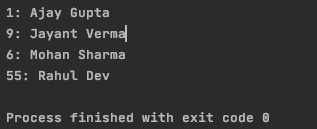HashMaps are fundamental data structures in Java, providing efficient key-value storage and retrieval. However, HashMaps don’t inherently maintain any specific order. This raises the question: can we impose order on a HashMap, specifically using a Comparator? The answer is a nuanced yes, but not directly.
Understanding HashMap and Comparator
HashMaps store elements in key-value pairs, where each key is unique and used to access its associated value. They offer constant-time performance for basic operations like put, get, and remove.
Comparators, on the other hand, are used to define a custom ordering for objects. They implement the Comparator interface and provide a compare method that dictates the order of two objects.
Since HashMaps don’t maintain order, applying a Comparator directly to a HashMap is not possible. HashMaps use hashing for efficient storage and retrieval, and hashing doesn’t inherently support ordered comparisons.
Sorting HashMap Entries with Comparator
While we can’t directly apply a Comparator to a HashMap, we can sort its entries based on values using a Comparator. This involves extracting the entries into a collection that supports sorting, like a List, and then applying the Comparator to that collection.
Sorting by Value: String Example
Let’s consider a HashMap with String values. To sort by value alphabetically:
-
Extract the entries into a
List<Map.Entry<String, String>>. -
Use
Collections.sortwith a custom Comparator that compares the values (Strings in this case) usingString.compareTo.
Collections.sort(list, new Comparator<Map.Entry<String, String>>() {
public int compare(Map.Entry<String, String> entry1, Map.Entry<String, String> entry2) {
return (entry1.getValue()).compareTo(entry2.getValue());
}
});- Create a new
LinkedHashMap(which maintains insertion order) and populate it with the sorted entries.
This process effectively sorts the HashMap entries by value, preserving the key-value associations in a new, ordered map.
Sorting by Value: Integer Example
For Integer values, the process is similar:
-
Extract the entries into a
List<Map.Entry<String, Integer>>. -
Use
Collections.sortwith a custom Comparator that compares the Integer values usingInteger.compare. Alternatively, leverage the natural ordering of Integers.
Collections.sort(list, new Comparator<Map.Entry<String, Integer>>() {
public int compare(Map.Entry<String, Integer> entry1, Map.Entry<String, Integer> entry2) {
return Integer.compare(entry1.getValue(), entry2.getValue());
}
});- Create a new
LinkedHashMapand populate it with the sorted entries.
Sorting with Custom Objects and Comparator
When values are custom objects, implementing a custom Comparator is crucial. The compare method should define the sorting logic based on the object’s fields.
 Custom Comparator
Custom Comparator
Conclusion
While you can’t directly use a Comparator with a HashMap, you can achieve sorted order by extracting the entries, sorting them with a Comparator using Collections.sort, and then creating a new LinkedHashMap with the sorted entries. This approach provides a practical solution for ordering HashMap data based on values, utilizing the flexibility of Comparators for custom sorting logic. Remember to choose the appropriate sorting method based on your value data type (String, Integer, or custom objects).
